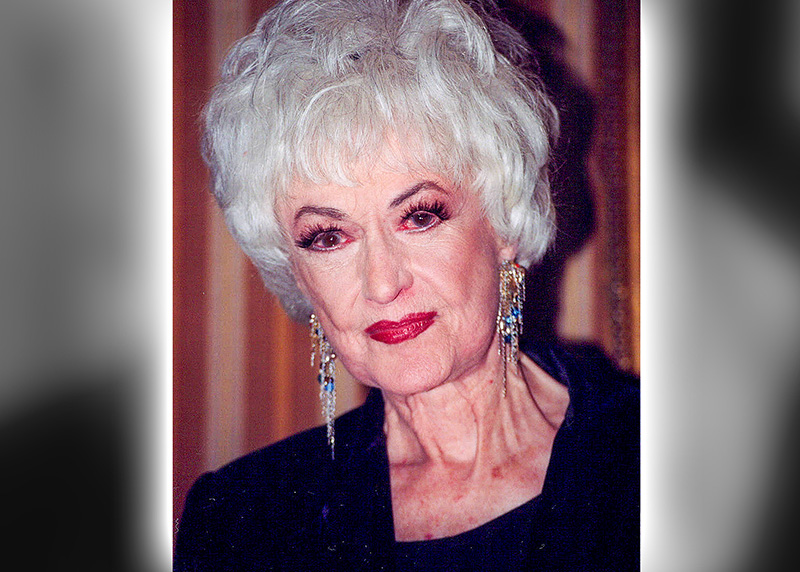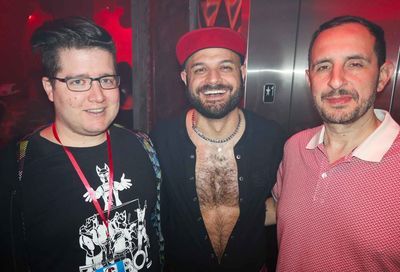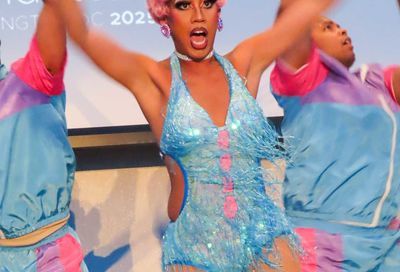
The Obama administration is facing criticism for failing to emphasize support for LGBT-rights during a historic gathering of African leaders in Washington this week.
Beginning Monday, nearly 50 African leaders convened for the U.S.-Africa Leaders Summit, the largest event an American president has ever held with African heads of state and government, but an emphasis on strengthening business ties persisted throughout the three-day conference.
“The future of Africa’s economy depends on tapping the full potential of its people. Respecting human rights and individual liberty is a fundamental building block of development and economic prosperity,” said Ty Cobb, director of Global Engagement for the Human Rights Campaign, in a statement. “Thus far, we’ve seen little indication that the United States government and our nation’s corporate leadership seized the opportunity to underscore this critical message as it specifically relates to LGBT Africans.”
Indeed, heads of state from 32 of the 37 nations in Africa that criminalize LGBT relationships were invited to the summit, according to a report released by HRC and Human Rights First. Those leaders included Ugandan President Yoweri Museveni and Nigerian President Goodluck Jonathan, who both signed anti-LGBT laws earlier this year and attended a state dinner at the White House Tuesday night where they were photographed with the president and first lady Michelle Obama.
Despite the presence of those leaders, support for LGBT-rights was only mentioned in passing during remarks delivered by President Barack Obama, Vice President Joe Biden and Secretary of State John Kerry.
“Some of the incredible cultures of some of our U.S. businesses that do a really good job promoting people and maintaining a meritocracy, and treating women equally, and treating people of different races and faiths and sexual orientations fairly and equally, and making sure that there are typical norms of how you deal with people in contracts and respect legal constraints — all those things I think can then take root in a country like Zimbabwe or any other country,” Obama said Tuesday during a U.S.-Africa business forum. “Hopefully, governments are encouraging that, not inhibiting that. They recognize that that’s how the world as a whole is increasingly moving in that direction.”
Speaking during a Monday forum on civil society, Kerry vowed that the U.S. would continue to call for support of LGBT-rights, declaring that respect for human rights is not just an American value, but a universal value and aspiration.
“We will continue to stand up and speak out for civil society organizations around the world and in Africa that face attacks, that push for less onerous regulations on their work, and that struggle with restrictions on what they can do, what they can say, where they can work, how they can obtain funding,” Kerry said. “And we will continue to stand up and speak for the rights of all persons with disabilities, and we will continue to stand up and speak out for LGBT activists who are working for the day when tolerance and understanding really do conquer hate. And we will do so because we know that countries are stronger and more stable when people are listened to and given shared power.”
Despite those remarks, LGBT-rights advocates say an opportunity was missed to speak directly about respect for human rights, particularly to leaders of countries with the some of the world’s worst records on LGBT rights, and to include those fighting for equality in discussions with those leaders.
“The Obama Administration has unequivocally demonstrated global leadership on the human rights of LGBT people, and the president will leave a legacy for his engagement with international civil society,” said Human Rights First’s Shawn Gaylord in a statement. “That is why it is most disappointing that the White House chose to keep these issues literally on the margins in side events, and exclude civil society and human rights defenders from the same White House meetings corporate CEOs and investors were invited to.”
The summit comes less than a week after the Constitutional Court of Uganda overturned the African nation’s Anti-Homosexuality Act, ruling that the legislation was passed when parliament did not have a quorum. Some Ugandan leaders have announced they will again try to pass the legislation.
Ugandan President Yoweri Museveni signed the Anti-Homosexuality Act further enhancing penalties against homosexuality, prompting international condemnation and criticism from Obama himself. Violators of the law faced a 14-year prison sentence for a second conviction, and up to life in prison for repeat offenses. A number of actions were taken against Uganda for enacting the legislation, including cuts in aid and restricting entry to the U.S. by Ugandan officials involved in anti-LGBT human rights abuses. A report published in June by Ugandan activists detailed an increase in violence against LGBT Ugandans as well as loses of property, homes and income.
Last month, the leaders of nineteen LGBT and human rights organizations signed a letter urging Obama to include civil society voices during meetings with African leaders, describing the summit as an “unprecedented opportunity.” The letter also stated the economic themes of the conference would provide an opportunity to emphasize how homophobia and transphobia hurts trade and investment in emerging markets. Nevertheless, advocates say an opportunity to speak to leaders who most need to hear such messages was missed.
“By not including leading African activists in today’s Presidential-level discussions about strengthening democracy, improving diplomacy, and boosting security, the White House is missing a momentous opportunity to raise the importance of protecting human rights to the overall joint goals of the leaders,” Gaylord continued. “While the organizers sought out these opportunities in robust side events dedicated to civil society and other issues of human rights, these events were not widely attended by the leaders who most need to hear these messages.”
Responding to those criticisms, Ned Price, a spokesperson for the National Security Council, emphasized the Obama administration’s commitment to LGBT rights abroad.
“The Obama Administration has long spoken out—including with our African partners—in support of universal human rights and fundamental freedoms for all, including lesbian, gay, bisexual, and transgender individuals,” Price said in a statement. “The Summit has provided an opportunity to continue these conversations.”
Bea Arthur’s Air Force Bio Purged by Department of Defense
The DOD removed a page on actress Bea Arthur's military service to purge references to diversity and LGBTQ content.
By John Riley on March 27, 2025 @JRileyMW
A page touting Golden Girls actress Bea Arthur's military service during World War II was reportedly scrubbed from the U.S. Department of Defense website as part of the Trump administration's overzealous efforts to purge anything related to diversity or LGBTQ identity.
Last week, X user @swiftillery noted that the article on Arthur -- first published in October 2021 -- had been removed from the Defense Department website.
According to The Advocate, the Internet Archive documented a "404 -- Page Not Found" message at the URL where the article had been housed.
Becca Balint: The Pride of Vermont
From the classroom to Congress, U.S. Rep. Becca Balint has always been authentic about her LGBTQ identity and her political beliefs.
By John Riley on April 17, 2025 @JRileyMW
"I love people," says Becca Balint. "I love getting to know them. I love figuring out what makes them tick. I love laughing with them.... I love people, and I get energy from them."
The U.S. Representative from Vermont is definitely a people person: personable, gregarious, cheerful, and willing to engage in conversation, whether it's about serious, pressing political issues or more informal interactions, like cooing over her communication director's pet dog, who briefly appeared on screen during the first minutes of our Zoom interview.
Born on a U.S. Army base in Heidelberg, West Germany, Balint, the daughter of a service member who was himself an immigrant from post-World War II Hungary, lived briefly abroad before moving stateside to Peekskill, New York.
Gay Nightclub Bans All MAGA-Related Attire
Log Cabin Republicans balk at the Sacramento nightclub's ban on MAGA gear after patrons complained about one man's pro-Trump cap.
By John Riley on March 23, 2025 @JRileyMW
A popular LGBTQ nightclub in Sacramento, California, is prohibiting patrons who wear MAGA-related attire from entering the establishment.
Badlands, in the city's Lavender Heights district, announced the policy on social media. Management claimed they were motivated to impose the ban after a patron wore a MAGA hat while in the bar, leading some patrons to complain that they were made to feel uncomfortable and unsafe.
"At Badlands Sacramento, we are committed to creating a space where the LGBTQ+ community and our allies feel safe, welcomed, and respected," TJ Bruce, the bar's owner, wrote in a social media post. "Recently, a guest entered the bar wearing MAGA attire, which led to some discomfort among patrons.
Support Metro Weekly’s Journalism
These are challenging times for news organizations. And yet it’s crucial we stay active and provide vital resources and information to both our local readers and the world. So won’t you please take a moment and consider supporting Metro Weekly with a membership? For as little as $5 a month, you can help ensure Metro Weekly magazine and MetroWeekly.com remain free, viable resources as we provide the best, most diverse, culturally-resonant LGBTQ coverage in both the D.C. region and around the world. Memberships come with exclusive perks and discounts, your own personal digital delivery of each week’s magazine (and an archive), access to our Member's Lounge when it launches this fall, and exclusive members-only items like Metro Weekly Membership Mugs and Tote Bags! Check out all our membership levels here and please join us today!
The Magazine
-
Most Popular
 Feds Launch “Snitch Line” Targeting Trans Healthcare
Feds Launch “Snitch Line” Targeting Trans Healthcare  Gay Man is GOP Nominee in Virginia's Lt. Governor Race
Gay Man is GOP Nominee in Virginia's Lt. Governor Race  June Crenshaw Steps Down from Wanda Alston Foundation
June Crenshaw Steps Down from Wanda Alston Foundation  "Senate Twink" Says Video Sex Scandal Drove Him to Flee U.S.
"Senate Twink" Says Video Sex Scandal Drove Him to Flee U.S.  Off-Broadway's 'All the World’s A Stage' Is Tender, Timely, and True
Off-Broadway's 'All the World’s A Stage' Is Tender, Timely, and True  'Porn Star University' Started by Gay-for-Pay Creator Andy Lee
'Porn Star University' Started by Gay-for-Pay Creator Andy Lee  Abigail Spanberger Backed by HRC in Virginia Governor Bid
Abigail Spanberger Backed by HRC in Virginia Governor Bid  Nick Cave: The Wizard of Art
Nick Cave: The Wizard of Art  Gay Army Reserve Officer in Uniform Sex Video Scandal
Gay Army Reserve Officer in Uniform Sex Video Scandal  Jared Polis Signs Law Repealing Colorado's Gay Marriage Ban
Jared Polis Signs Law Repealing Colorado's Gay Marriage Ban
 Feds Launch “Snitch Line” Targeting Trans Healthcare
Feds Launch “Snitch Line” Targeting Trans Healthcare  Gay Man is GOP Nominee in Virginia's Lt. Governor Race
Gay Man is GOP Nominee in Virginia's Lt. Governor Race  June Crenshaw Steps Down from Wanda Alston Foundation
June Crenshaw Steps Down from Wanda Alston Foundation  "Senate Twink" Says Video Sex Scandal Drove Him to Flee U.S.
"Senate Twink" Says Video Sex Scandal Drove Him to Flee U.S.  Abigail Spanberger Backed by HRC in Virginia Governor Bid
Abigail Spanberger Backed by HRC in Virginia Governor Bid  Lesbian Firefighter Awarded $1.75 Million in Lawsuit
Lesbian Firefighter Awarded $1.75 Million in Lawsuit  Nick Cave: The Wizard of Art
Nick Cave: The Wizard of Art  Trans Women Not Legally 'Women,' UK Supreme Court Rules
Trans Women Not Legally 'Women,' UK Supreme Court Rules  Chef’s Best Is A Culinary Extravaganza For A Cause
Chef’s Best Is A Culinary Extravaganza For A Cause  This Week's Advertisers: Nick Cave - April 17, 2025
This Week's Advertisers: Nick Cave - April 17, 2025
Scene
Metro Weekly
Washington's LGBTQ Magazine
P.O. Box 11559
Washington, DC 20008 (202) 638-6830
About Us pageFollow Us:
· Facebook
· Twitter
· Flipboard
· YouTube
· Instagram
· RSS News | RSS SceneArchives
Copyright ©2024 Jansi LLC.










You must be logged in to post a comment.